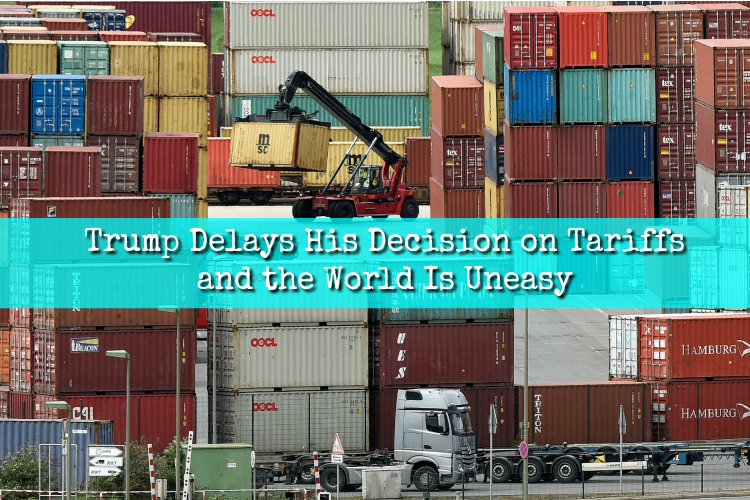If you're new here, you may want to subscribe to my RSS feed. Thanks for visiting!
by M. K. Matthews
The only certainty is that nothing is certain. – Pliny the Elder
President Trump has delayed his decision on whether or not he’ll be imposing tariffs, and it’s making the whole world uneasy.
The anxiously awaited decision has been delayed on imposing tariffs on imported steel and aluminum on the EU, Canada, and Mexico for 30 days. The EU has promised retaliation of its own with a list of U.S. goods imported to Europe if it loses exemption status that is worth about $3.5 billion. The postponement will avoid a potential trade war with Europe as the U.S. engages in strategic trade talks with China this week.
China, Russia, and Japan have yet to be granted exemption status and steel shipments from those countries are anticipated to dwindle over time as a result. Recently, we published a huge list of all the items that will cost Americans 20-40% more should the tariffs come to pass.
Policy uncertainty is everywhere.
Uncertainty has slowed overall market movement for the month of April. The White House to do list is extensive and investors are waiting for decisions before making any major moves. The uncertainty includes
- the Iran nuclear deal
- the TPP
- the various tariff decisions that remain unsettled
- the possibility of a revised NAFTA
- a meeting of the Federal Reserve this week
Also under consideration is whether to permanently exempt EU, Mexico, Canada, Australia, Argentina and Brazil from the tariffs imposed last month on imported steel and aluminum.
All of these things are weighing down the market. This will not be cleared up quickly.
Here are the decisions that HAVE been made.
The Trump administration announced on Monday it had come to an agreement with South Korea on steel imports resulting in a revised trade agreement. Agreements in principle have been reached with Argentina, Australia, and Brazil regarding steel and aluminum that will be finalized soon.
The White House said in announcing these agreements, “in all of these negotiations, the administration is focused on quotas that will restrain imports, prevent transshipment, and protect the national security.”
The Trump administration is eager to get a revised North American Free Trade Agreement (NAFTA) to the House and Senate before January 2019. U.S. Trade Representative Robert Lighthizer told a gathering at the U.S. Chamber of Commerce on Tuesday that he hoped to strike a deal with his Canadian and Mexican counterparts within a week or two after high-level talks resume next week. He said a delay beyond that time frame risked “having a problem” in getting the new Nafta to a vote in Congress this year.
How this is affecting the market
The Dow Jones Industrial Average (DJIA, -0.27%) fell 64.1 points, or 0.3%, to end at 24,099.05. While the blue-chip average ended well off its lows of the session, having previously dropped more than 1%, it notched third straight daily decline. At its low of the day, the Dow was on track for its lowest close since April 2.
The S&P 500 index SPX, +0.25% rose 6.75 points to 2,654.8, a gain of 0.3%. The Nasdaq Composite Index COMP, +0.91% rose 64.44 points, or 0.9%, to finish at 7,130.70, supported by a rise in Apple and other major technology companies.
Tech was by far the biggest outperformer of the day, with the sector ending up 1.5%. That was enough to offset broad weakness elsewhere, as six of the 11 primary S&P 500 sectors ended lower and other industries saw only modest gains on the day. Among the biggest decliners were consumer staples, which fell 0.9%, and energy, which lost 0.6%. (source)
















One Response
This thing with the Korea’s has put a monkey wrench into a lot of Tramp’s decisions. So he and Bolt Heard and Wall Street have to look at other options.